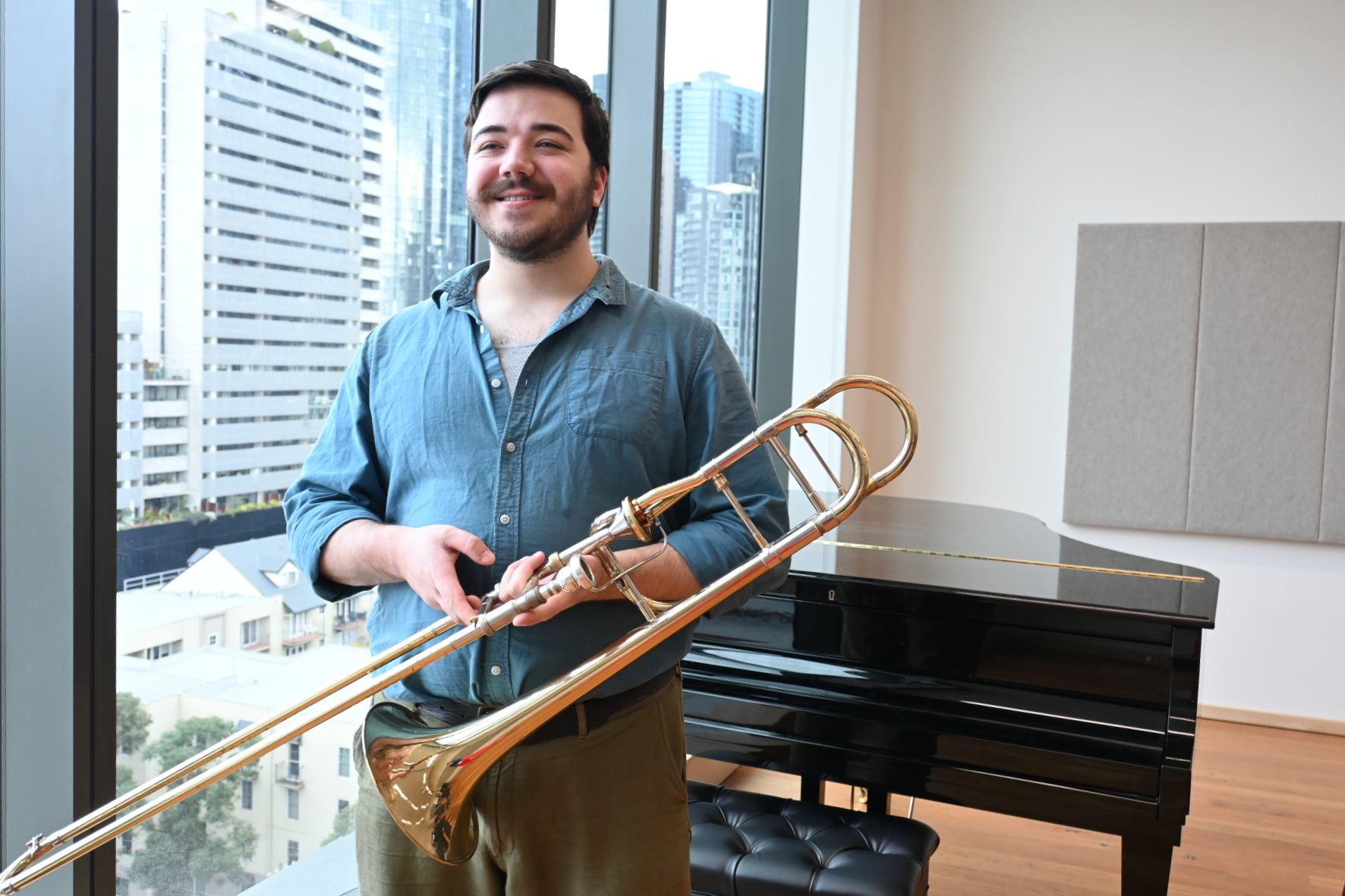From Melbourne to Asia with the University of Melbourne Symphony Orchestra: Meet trombonist Joshua Dulfer

Hear from Joshua Dulfer, a Bachelor of Music (Performance) student, as he speaks to his study experience and preparations for an upcoming international tour to Singapore and Malaysia with the University of Melbourne Symphony Orchestra.
Tell us about your life before studying at the University of Melbourne?
I grew up in Melbourne's northern suburbs in a musical family. From a young age, I was interested in classical music and jazz and had the chance to pursue both in and out of school. Between music and a brief attempt at a swimming career, I moved toward music.
Why did you choose to study at the University of Melbourne?
My choices for a performance-based degree were between Monash and the University of Melbourne at the Conservatorium. Fortunately, I received an early audition at Melbourne, where I met my future teacher Don Immel – we got along wonderfully. I also heard great things about the uni from friends, and my brother who had just finished his Diploma in Music at Melbourne. There were a lot of good things.
What have you enjoyed most about your degree?
I've made good friends through the smaller cohort. Three weeks into my first year, we went into lockdown, and it could have been tough getting to know people if I hadn't shared classes with the same small group.
I also enjoy the Southbank campus, especially the Ian Potter Southbank Centre. I love practicing on the seventh floor, which overlooks the city and, on a clear day, I have a view all the way to the beach. The acoustics are good, and we're within walking distance of everything in Southbank.
Can you describe your experience of playing with the University of Melbourne Symphony Orchestra?
I've always enjoyed the social aspects of music making, the things that you can create together, and acting as a small cog within a much larger machine.
Playing in the Orchestra has been vital to my musical development. If I'm honest, there's a good chance I wouldn't pursue orchestral music the way I have without this ensemble.

How did you become interested in playing the trombone?
My dad was an orchestral musician, and when I wanted to pick up a second instrument, he encouraged the trombone. It made a lot of sense. I got to play in the jazz bands at school, which were great, and still pursue orchestral music.
I also always wanted to play the imperial march from Star Wars and make the loudest noises possible.
In an orchestral setting, what role do you see the trombone playing within the brass section, and how does it interact with other instrument families?
The trombone plays a unique role for so many reasons. Firstly, we act as a part of the low brass section, four players, each with a unique part. We work as a small unit with specialised roles and always as a team.
The flip side is that the trombones play far less than most instruments within the Orchestra, so we often go 100 bars or more without playing.
This comes with its perks; we almost always play a vital role because everyone else has disappeared, leaving a beautiful chorale, or because we are loud enough to sit at the top of the texture.
What unique challenges do trombone players face when performing in an orchestra?
Trombone players are constantly battling with balance within the Orchestra. It's easy for trombones to overpower other sections or underplay important melodies, not to mention disrupting the balance within their own section.
The trombone often plays loud and full, which means you must commit to whatever sound comes out of your instrument and make it loud and proud, regardless of whether you are correct.This can be daunting if you're not prepared.
How do you prepare for an orchestral performance?
Building trust within your section is vital. In preparation for rehearsals, the low brass section will always find a few hours to sit down and get on the same page. Preparation is everything – making a difficult musical decision is much easier when you know your section is backing you.
What are you most looking forward to about going 'on tour' with the Orchestra?
The opportunity to travel with great friends and form amazing stories is what i'm looking forward to the most. This will be my first chance to travel internationally with the University – I'll see amazing places, listen to brilliant musicians, and experience new cultures while performing some of my favourite works with my friends.
You get to know the people you're traveling with, and the performances are always exciting. On tour, everything that can go wrong will, but that is exciting in its own way. It's a real test of some musical skills that are hard to develop elsewhere.
What advice would you give to students considering studying at the University of Melbourne?
Get as much advice as possible from students a year or two ahead of you. University systems can be tricky, especially regarding enrolment and choosing subjects to pick. With the information I gathered from others already studying at the University, I was able to hit the ground running.